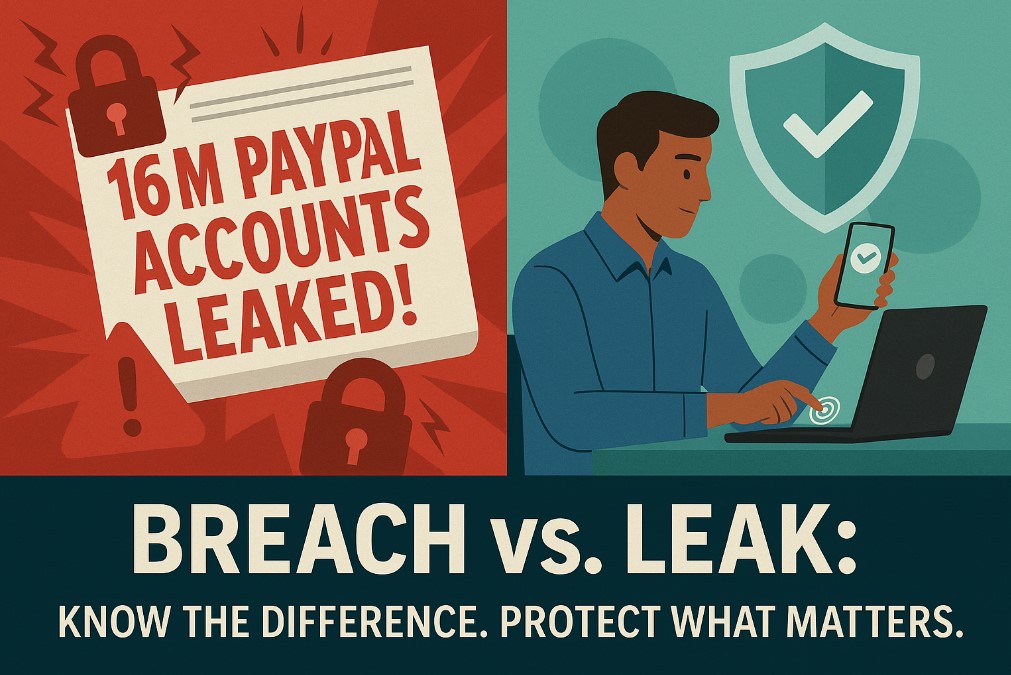Headline vs. Reality
In mid-August 2025, cybercriminals claimed to be selling a dataset of 15.8–16 million PayPal accounts on the dark web. PayPal quickly denied any breach of its systems. Security researchers now believe the data was likely compiled from:
- Infostealer malware on infected personal devices.
- Credential reuse (people using the same email/password across multiple sites).
- Previously leaked or phished credentials rebranded as “new.”
The takeaway: PayPal wasn’t breached. But millions of individuals—and their employers—are still at risk from credential-stuffing attacks and account takeovers (ATO).
Why SMBs Should Care
It’s tempting to treat this as a consumer-only issue. But employees often reuse personal credentials for business logins. That means a PayPal “breach” could quickly ripple into your environment if a staffer reuses the same password for:
- Office 365 or Google Workspace.
- SaaS apps like Salesforce or QuickBooks.
- VPN or remote access portals.
This crossover risk is exactly what criminals count on.
Five Steps SMBs Can Take Today
- Adopt Passkeys (or at least unique passwords)
- Passkeys, where supported, eliminate password reuse entirely.
- At minimum, enforce the use of a password manager across your organization.
- Mandate Multi-Factor Authentication (MFA)
- Prioritize phishing-resistant MFA like security keys or app-based prompts.
- Secure Endpoints Against Infostealers
- Regular patching, strong EDR, and blocking shady browser extensions go a long way.
- Monitor for Leaked Credentials
- Use services that alert you if employee or company domains show up in breach dumps.
- Have an ATO Playbook
- Document how to respond when an account is compromised: reset credentials, enforce step-up authentication, and monitor transactions.
Communicating During Scary Headlines
Your customers and staff will hear about incidents like this. Even if your company isn’t affected, it’s smart to:
- Acknowledge the news.
- Clarify the facts (“PayPal itself wasn’t hacked”).
- Share the steps you’re taking to keep accounts secure.
- Offer guidance (e.g., how to enable MFA, reset reused passwords).
A calm, transparent message builds trust and reinforces your brand as security-conscious.
Strengthen Your Knowledge With Additional Resources
When big headlines break, it helps to cut through the noise with trusted resources. To dive deeper into protecting your business from phishing, spoofing, and account takeover risks, explore some of our related blogs:
- How to Spot and Stop RFQ Phishing Scams
- Why PCI DSS v4.0 Makes DMARC More Critical Than Ever
- AI-Powered Business Email Compromise: The Next Wave of Social Engineering
For context on the recent PayPal headlines, here are reliable external reports:
- PayPal Denies Breach After 16M Alleged Accounts Surface Online — ITPro
- 16 Million PayPal Accounts Claimed for Sale on Dark Web — BleepingComputer
Final Word
Not every headline is a hack, but every headline is a reminder. The PayPal data dump highlights a familiar story: password reuse is still one of the most dangerous cybersecurity habits.
SMBs that adopt passkeys, enforce MFA, and prepare an ATO response plan won’t just weather the news cycle—they’ll actually reduce their risk.
Call to Action:
👉 Ready to tighten your security posture? Schedule a free 30-minute consultation with Poole Technology Solutions to discuss practical steps you can implement this month.



